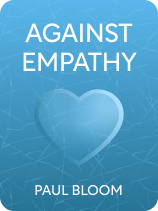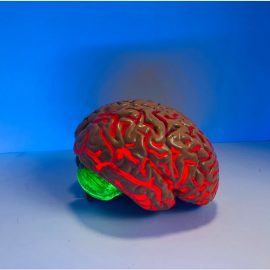

This article is an excerpt from the Shortform book guide to "Against Empathy" by Paul Bloom. Shortform has the world's best summaries and analyses of books you should be reading.
Like this article? Sign up for a free trial here.
Are you for or against empathy? Why would anyone ever be against it? Is there such a thing as too much empathy?
In Against Empathy, Paul Bloom argues that we rely too heavily on our emotions—especially empathy—to guide our judgments, decisions, and behavior. He suggests that our empathic responses to other people can lead us away from the morally good and right course of action.
Continue reading for an overview of this contrarian book.
Against Empathy by Paul Bloom
It’s conventional wisdom that, when we neglect to treat another person with kindness or fail to understand one another, a lack of empathy is to blame—and that we could fix the problem by trying more intentionally to experience the world as other people do. But, what if it’s not a shortfall of empathy but an excess of it that causes us to treat each other badly?
In Against Empathy, Paul Bloom argues that, if we want to make the world a better place, we may need to change our relationship with empathy, putting this emotional response to others’ suffering aside and applying a rational form of compassion instead.
Bloom is a professor of psychology and cognitive science at Yale University. He’s also the author of a number of books, including Just Babies (2013), The Sweet Spot (2021), and Psych (2023). Against Empathy (2016) is an extension of ideas that originally appeared in publications such as The New Yorker and The Atlantic.
We’ll explore the case that Bloom makes against allowing empathy to influence our decisions. We’ll look at why empathy may not be necessary for us to behave kindly and compassionately toward other people, and we’ll also explore how Bloom recommends making better, more moral decisions.
What Is the Case Against Empathy?
Bloom argues that empathy is inadequate for the task of guiding decisions that have moral consequences. He writes that, when we allow empathy to direct our decisions, we often fail to make the world a better place. So, he proposes that, instead of letting empathy determine our actions, we should make decisions rationally instead.
We’ll explore what empathy is, how Bloom makes the case against empathy as a guide for our behavior, and the consequences that result from relying too heavily on empathy in our judgments and decisions.
What Is Empathy?
Empathy is the experience of understanding the world as someone else does, a definition that Bloom borrows from philosopher Adam Smith. Bloom explains that, when Smith was writing in the 18th century, what we call “empathy” today went by the name of “sympathy,” which Smith defined as our natural capacity to feel what others feel.
Feeling empathy for other people requires us to blur the lines a little between ourselves and others. Bloom writes that while there is a difference in the brain’s representation of the self versus the other, there is also an overlap between them, and this overlap may confer evolutionary advantages. For instance, it may prompt us to protect our family members as we protect ourselves, ensuring the survival of our genetic material.
Bloom differentiates between two types of empathy that equip us with distinct ways of caring about other people: cognitive empathy and emotional empathy.
Emotional Empathy Versus Cognitive Empathy
In defining empathy and sketching out his case against it, Bloom characterizes “emotional empathy” and “cognitive empathy” as two distinct internal experiences. He writes that some neuroscientists believe that the brain actually uses two different systems for these processes, one that allows us to feel someone else’s feelings and another that allows us to understand someone else’s feelings.
The kind of empathy that Bloom argues against throughout the book is emotional empathy. Emotional empathy involves feeling someone else’s emotions and simulating their experiences. This ability is thought to draw on neural systems like mirror neurons: brain cells that activate both when we perform an action and when we observe someone else perform it. Some researchers think mirror neurons represent the neural starting point of empathy.
Cognitive empathy entails a more distanced appreciation of someone else’s experiences. Also called “mentalizing” or “theory of mind,” cognitive empathy involves understanding the emotions someone else is experiencing without experiencing them yourself. Bloom doesn’t oppose the use of cognitive empathy. In fact, he suggests that we need to understand others’ experiences to make morally good decisions, and cognitive empathy helps us do that.
When Bloom writes that empathy is an inadequate guide for our judgments and decisions, he’s talking about emotional empathy. From this point onward, when we refer to “empathy,” we’ll be talking about emotional empathy rather than cognitive empathy.
What’s Wrong With Empathy?
Though many people think that society suffers from a shortage of empathy, Bloom argues that more empathy wouldn’t make the world a kinder place. He concedes that in studies and in some real-world situations, experiencing empathy for other people can make us kinder people, even though we do an imperfect job of understanding others’ feelings. But, he writes that morality requires more than empathy and that we have more effective ways to be kind and compassionate.
Bloom says that one way to make moral decisions without relying on empathy is to adopt the philosophy of “consequentialism,” an ethical theory that suggests we consider the likely outcomes of our actions and try to make decisions that will achieve the best results. Bloom argues that when we consider decisions this way, we can see that the consequences of empathy are often negative.
Because we can’t predict what will happen in the future, actions motivated by empathy can have unintended consequences. Bloom writes that empathy leads to bad decisions and decisions that result in bad outcomes. For example, you might feel bad for a friend at work who was passed over for a promotion and put in a good word for them with your boss. If they get a promotion and turn out to be a terrible manager, that’s an unintended bad outcome for your friend and the people they manage.
Bloom also argues that we can observe many shortcomings of empathy in the negative consequences it creates for the quality of our decisions and their outcomes. Next, we’ll explore some of the negative ways that empathy can influence our decisions and actions.
Empathy Reinforces Our Biases
First, empathy predisposes us to favor the people with whom we most strongly identify—those who are related to us, similar to us, and psychologically close to us—so it can prejudice us against people who are different or distant from us. Similarly, whether we feel empathy for someone is influenced by what we think about the person and how we judge their situation.
Prejudices and biases are a problem because, according to Bloom, impartiality is the core of all moral systems. Though few people would choose a moral system of total impartiality—most of us think it’s correct that we care more about people who are close to us than about strangers—empathy’s biases make us less able to make fair moral judgments.
Empathy Motivates Actions That Are Kind, But Not Morally Right
Bloom writes that a second shortcoming of empathy is that it motivates us to alleviate suffering in the short term by taking actions that may have negative consequences for the person we’re trying to help, or even an entire group of other people, in the long term.
One reason that actions motivated by empathy aren’t always moral is because empathy is often arbitrarily focused. Bloom points out that we don’t look logically at where we could do the most good. Instead, we allow our attention and preferences to dictate how we direct our empathy. This is why the actions that empathy motivates may not be the morally right course of action, even though they’re kind.
For example, parents motivated strongly by empathy may try to avoid causing their children to suffer in the short term and fail to keep longer-term priorities in mind. The action that’s the most loving and intelligent (and morally right) is to require a child to go to the dentist or do their homework, even if it causes pain or frustration at the moment.
Empathy Is Limited in Focus
A third flaw of empathy is that empathy is easier to feel for one person than for multiple people and difficult to feel for a group, so empathy biases us toward decisions that prioritize an individual over a group. That’s less than optimal if prioritizing the needs of one person results in negative consequences for others.
Empathy Is Exhausting
Fourth, empathy can be onerous to experience and sustain: Bloom writes that people who put others’ needs before their own or are otherwise highly empathetic can experience negative consequences, like feeling upset about other people’s pain or being in relationships where they don’t receive as much care as they give. This happens because empathy involves suffering when other people are suffering, which not only feels distressing but can also impair our ability to help the person who is suffering.
Empathy Motivates Violence
A final flaw of empathy is that it can motivate us to behave aggressively to protect someone who has been wronged. Bloom writes that empathy can even motivate us to engage in conflict on behalf of the victim of violence or injustice.
He offers the example of how white people in the American South empathized with white women allegedly raped by Black men and responded with lynchings and other forms of violence.
Why Isn’t Empathy Necessary?
We often rely on empathy when we make decisions that affect other people. Even though Bloom argues against relying on empathy, he doesn’t advocate for behaving selfishly or failing to consider the needs of others. Instead, he asserts that we can be kind and compassionate people without making empathy a part of our decision-making process.
We’ll explore Bloom’s explanation of how we don’t have to empathize with someone to treat them kindly or to act morally. We’ll also examine his argument that violence and cruelty don’t result from a lack of empathy and set out his argument that it isn’t empathy that makes us behave in ways that are morally right.
We Don’t Need Empathy to Act With Kindness
One reason that Bloom suggests that empathy is unnecessary is that we don’t have to feel empathy for someone to treat them kindly. This idea breaks down into three insights: that there are multiple emotions that enable kind behavior, that care is better than empathy at motivating kindness, and that concern motivates care. We’ll take a closer look at each of these next.
Self-Control, Intelligence, and Compassion Enable Kindness
Bloom writes that it’s not empathy but self-control, intelligence, and compassion that help us behave kindly toward others. Self-control and intelligence are relatively self-explanatory, and Bloom defines compassion as a concern for others and a desire for them to succeed.
We Can Behave Kindly by Caring, Not Empathizing
Not only does Bloom write that empathy is unnecessary to care for other people, but he also argues that we can be better, more moral people if we resist acting as empathy prompts us to. For example, when someone is in distress, it can sometimes be more helpful if we can react calmly and rationally rather than taking on the other person’s distress. That way, our ability to understand the situation and problem-solve won’t be hindered by our emotions.
Bloom points out that we feel happy when someone we love is happy and sad when someone we care about is sad not because our emotions mirror the other person’s, but because they arise from our care for the other person. He also points out that our emotions can actually get in the way of sharing in someone else’s happiness, such as when we’re envious of the accomplishment that’s made them happy, in which case it’s better not to rely on our emotions.
Concern, Not Empathy, Motivates Us to Care for Others
Another reason that we don’t need empathy to act with kindness is that it’s not actually empathy, but concern, that motivates us to care for other people. The pressures of natural selection motivate altruistic behavior because it’s evolutionarily advantageous for us to care for those who share our genes. So, Bloom explains, human evolution has equipped us with a fundamental concern for other people’s welfare. This evolved capacity for concern (rather than empathy) is what motivates us to care for others.
We Don’t Need Empathy to Understand Morality
A second reason that Bloom argues empathy is an inadequate guide for our moral decisions is that our moral system consists of more than simple empathic responses. Bloom suggests that children’s ability to help others, perhaps without true empathy, shows that we can behave in ways that care for others without feeling their emotions or taking on their experiences.
Bloom considers the idea that empathy might represent a developmental stepping stone toward a more mature understanding of morality. But he concludes that we don’t have enough evidence to know whether children help others because they’re empathizing (feeling what others are feeling) or because they’re just caring for others. Because the evidence is inconclusive, Bloom writes that we can’t demonstrate that empathy is necessary for the development of morality.
It’s Not a Lack of Empathy That Causes Violence and Cruelty
Finally, a third reason that Bloom characterizes empathy as unsuitable for guiding our decisions is that empathy doesn’t always prevent us from treating other people badly and, conversely, it’s not necessarily a lack of empathy that causes violence or cruelty.
Bloom writes that there are several theories about why we behave cruelly. Some experts think of violent behavior as a dysfunction of self-control. Others believe that violence is just part of our nature. Plus, we sometimes act cruelly in ways that are deliberate and consistent with our sense of morality. In all of these cases, it’s not a lack of empathy that causes violent behavior.
Some experts do theorize that a lack of empathy can lead to aggression by causing us to dehumanize and objectify other people. But Bloom argues that empathy isn’t a necessary component of our capacity to avoid dehumanization. In other words, we don’t need empathy to choose to treat other people as fully human.
Bloom also points out that, as we noted earlier, empathy (rather than a lack of empathy) may be implicated in some acts of violence. For instance, empathy may have played a part in motivating atrocities such as the genocide of Jewish people during the Holocaust. That’s because people were prompted to empathize with German children who had allegedly been abused by Jewish people to such an extent that they believed that cruel and violent acts, including genocide, seemed justifiable.
How Can We Make Better Decisions, With or Without Empathy?
In deconstructing how empathy affects our decisions and leads to less-than-ideal outcomes, Bloom proposes an alternative to empathy: reasoned compassion. We’ll explore how Bloom describes reasoned compassion and argues that it gives us the capacity to behave more rationally than we do when guided by empathy. We’ll also examine Bloom’s recommendations for strategies you can use to make more moral decisions when your actions affect other people.
What Is Reasoned Compassion?
In arguing against making decisions using empathy, Bloom asserts that we should use a conscious, deliberate, “reasoned” compassion to ensure that we act with care for others.
Though “reasoned compassion” might sound similar to “cognitive empathy”—which, as a reminder, involves understanding others’ experiences and does have a place in our interactions with others, according to Bloom—there’s a key difference between the two. While cognitive empathy involves understanding what another person is feeling, compassion is less about thinking through another person’s experience and more about caring about them and their welfare. Because compassion involves caring about other people and wanting them to be happy and thrive, it enables us to feel for others without taking on their feelings.
Bloom explains that, with reasoned compassion, we can bring our capacity for rational thinking to bear on moral problems. This form of compassion combines our capacity to care about other people with our ability to make detached, objective decisions. Intelligence, self-control, and concern for others are all key components of reasoned compassion, and these can all inform our decisions. For example, if your community is hit by a devastating storm, you might make a logical plan to distribute resources as widely as possible to the people affected, rather than focusing solely on people you know and with whom you naturally empathize.
Do We Have the Capacity for Reason?
Bloom anticipates one major reason why people might object to his suggestion to replace empathy with rational compassion: Some scholars suggest that our capacity for rational thinking isn’t strong enough (or dominant enough) to win out over more emotional influences. But Bloom disagrees. He asserts that we can choose reason over emotion when we make moral decisions.
An enduring idea in psychology is that we have two cognitive systems that engage in very different kinds of thinking: emotional and rational. Bloom explains that according to some researchers, the rational system is often powerless to overrule the emotional system. We’re irrational in many ways: We use heuristics, or mental shortcuts, to make decisions, which sees us succumb to the influence of cognitive biases and ignore base rates in our probability estimates, making incorrect judgments and irrational decisions.
But, Bloom writes that, if these flaws in our decision-making make it clear that we’re irrational, our ability to overcome them illustrates how intelligent we can be despite our irrationality. He suggests that though our ability to engage in rational thinking isn’t enough on its own to make us good or moral people, rationality is a key part of morality. Ultimately, he concludes that we all have the capacity to behave rationally and make better decisions.
How Can We Make Better, More Moral Decisions?
If you want to follow Bloom’s advice to rely less on empathy and more on rational compassion to guide your decisions, it might help to have an idea of where to start. We’ll explore four ideas that Bloom offers for making better decisions: strategies that involve exercising your capacity to think rationally and use empathy productively and appropriately.
Exercise Self-Control
The first strategy for improving compassionate decision-making is to practice self-control, even in situations where you tend to react emotionally. Bloom writes that self-control may be the most useful measure of rational thinking because exercising self-control requires you to check your emotions, impulses, and irrational thinking. Practicing self-control can help you use reasoned compassion instead of empathy when you make decisions.
Focus on the Decisions That Matter
Another strategy that might help you to make better moral decisions involves paying particular attention to the choices that matter most. Bloom writes that it’s most important to behave rationally when we’re making decisions that affect other people: These are situations in which the choices we make carry moral weight.
By drawing on our innate concern for treating people kindly and equitably and not harming them, we can make decisions that treat every person as valuable, according to Bloom. This can help us act more compassionately toward everyone than we would if we relied solely on our emotional responses since we feel the value of the lives of those closest to us more keenly.
Consider the Consequences
A third technique to improve your decision-making process involves considering the repercussions that your choices may have for other people. Bloom writes that to make choices that are morally good, you have to anticipate the consequences of your actions. Since empathy doesn’t always have positive consequences—and often has negative ones, as Bloom argues throughout the book—thinking through the possible consequences of your actions can help you make more moral decisions and optimize your chances of achieving good results.
Use Empathy Productively
Finally, Bloom concludes that it’s important to put empathy into its proper place in our decision-making processes. We can lean on our emotions to motivate us to do good, but we can use our reasoning abilities to figure out how to do good. Empathy’s weaknesses can outweigh its strengths when we use it in the wrong context. When we need to make decisions with moral weight, it makes sense to use alternatives such as reasoned compassion.

———End of Preview———
Like what you just read? Read the rest of the world's best book summary and analysis of Paul Bloom's "Against Empathy" at Shortform.
Here's what you'll find in our full Against Empathy summary:
- How the conventional understanding of empathy gets it wrong
- How empathy can motivate us to act in unjust, irrational, and cruel ways
- Why we should practice rational compassion instead of empathy






